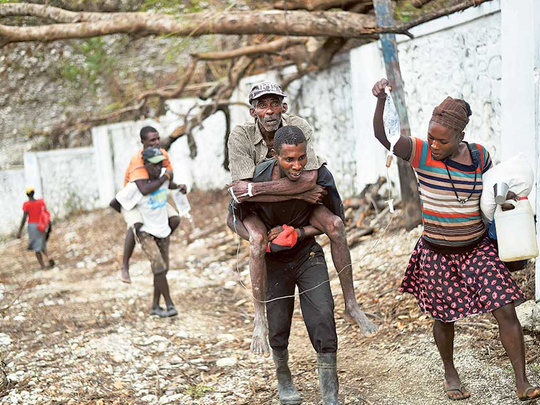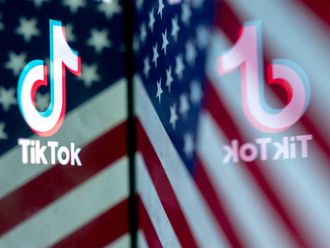
United Nations: Ever since UN peacekeepers introduced a devastating cholera epidemic to Haiti in 2010, Secretary-General Ban Ki-moon has insisted that the global body is immune from legal claims. In the past few months, he has acknowledged a “moral responsibility” for the epidemic, but he has stopped short of saying sorry.
Now, with barely two months left in his term, Ban’s administration is scrambling to compensate, for the first time, those who have suffered, with a plan to give them or their communities cash payments from a proposed $400 million (Dh1.46 billion) cholera response package. He also wants to make good on an unfulfilled promise to eradicate cholera from Haiti, which continues to claim lives.
But the UN does not have the money it needs for the proposed package, and is facing criticism that it still is avoiding legal culpability for one of the worst calamities to ever befall Haiti, the Western Hemisphere’s poorest country.
Roughly 9,500 Haitians have died from cholera — some researchers say the toll could be far greater — and hundreds of thousands have been sickened. The disease has surged in the aftermath of Hurricane Matthew.
The proposed package follows the first acknowledgement by the UN in August that it played a role in the initial outbreak of the disease, six years ago, in October 2010.
The acknowledgement was made after a scathing internal report by an independent UN human rights adviser, Philip Alston, decrying what he called the organisation’s years of silence and denial, was leaked and published in The New York Times. The admission also came just before a federal appeals court in New York upheld the immunity of the UN from prosecution under a long-standing diplomatic treaty.
The most basic details of the proposed package are still under discussion. It requires of the UN a delicate diplomatic balance — weighing considerations of donors who will pay for it, and of victims who have been demanding justice.
The official roll-out of the package, expected in the coming weeks, is designed in part to repair the damage cholera has done to the reputation of the UN, which regularly presses governments around the world to pursue accountability, and to help Ban’s legacy in particular.
“We want to do this because we think it’s the right thing to do for the Haitian people, but frankly speaking, it’s the right thing to do for the United Nations,” Jan Eliasson, the UN deputy secretary-general, said in a telephone interview.
Whether the package will satisfy Haitian victims and their families who have unsuccessfully sought to sue the UN in the United States remains unclear. Lawyers for the victims have not yet decided whether to pursue further appeals, including to the US Supreme Court.
About $200 million of the package is meant for what UN officials call “material assistance” to families and communities who were most affected. (The other $200 million would help pay for cholera eradication and improved sanitation.) The officials avoid the term “compensation” partly over fear among donors that it could set a precedent.
Diplomatic officials of the United States, the biggest funder of the UN, have said nothing publicly about the “material assistance” part of the package, nor whether the US government would help pay.
Also unclear is whether Ban will issue an apology — going beyond his expression of “deep regret” over the cholera outbreak. That too comes with concerns attached: Will saying sorry open the UN to further legal claims?
The package is expected to come under scrutiny Tuesday when Alston, a New York University law professor who serves as one of the United Nations’ many independent experts on human rights issues, speaks before a committee of the General Assembly.
Alston already has criticised the package, saying that one-time payments do not let victims have their day in court.
“It will be a travesty of justice if, having moved so far in such a short time, the United Nations finds itself at the last moment unable to accept the principle of accountability, the avoidance of which has motivated the long years of total denial, and if it is similarly unable to embrace the principle of respect for the rights of victims to compensation as opposed to charitable payments,” he wrote to Eliasson on Oct. 5.
Payments made without addressing the organisation’s legal responsibility, Alston said, would only perpetuate the “veil of silence” that has surrounded UN policy on the issue.
Eliasson diplomatically disagreed, saying in a letter responding to Alston that it was incorrect “to see our approach as an act of charity.”
He reinforced that view in a telephone interview, saying it was important for the UN to assert “a strong legal position with compassion and solidarity.”
“What can we do to put things as right as possible for the Haitian people and the United Nations?” he said. “I tell you, a lot of people have felt ill at ease about this for a long time.”
Cholera, an infectious and potentially fatal disease spread via contaminated drinking water, had never been present in Haiti until UN peacekeepers on assignment from Nepal, where cholera is common, disposed infected waste into a river. The disease spread ferociously in a nation still traumatised by a devastating earthquake that had wreaked havoc on water and sanitation systems.












